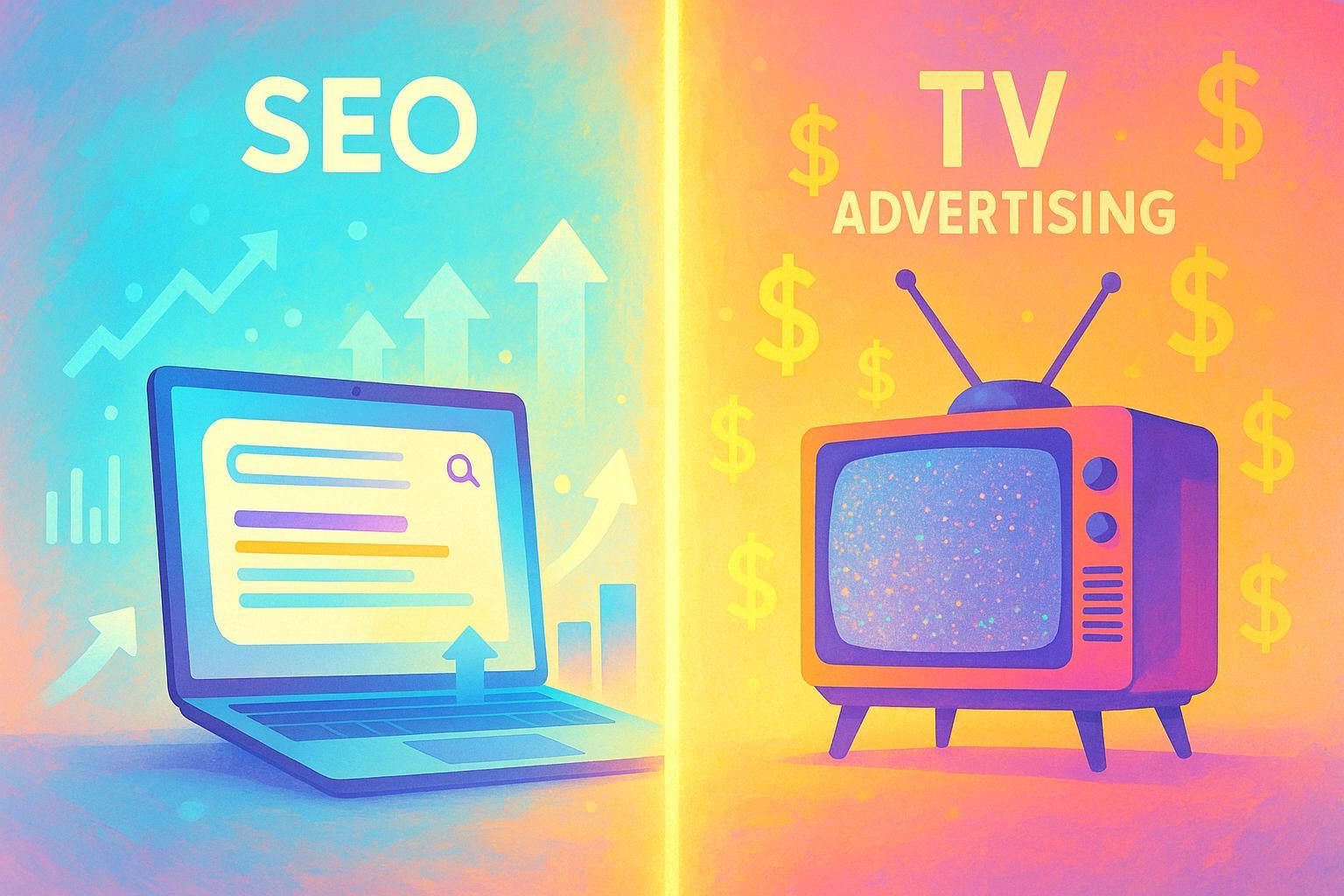Which is better for law firms working on market expansion? Here’s the answer upfront: SEO offers better long-term results, lower costs, and higher-quality leads, while TV advertising provides quick brand visibility but at a higher price with less targeted outcomes.
Key Takeaways:
- SEO Benefits: Builds trust, improves search rankings, and attracts clients actively searching for legal help. Costs range from $500 to $10,000 per month and deliver lasting ROI over time.
- TV Advertising Benefits: Boosts brand awareness quickly but is expensive, often costing $7 to $24 per 1,000 views, and lacks detailed client engagement.
- Client Behavior: 96% of people use search engines to find lawyers, and 98% validate referrals online, making digital presence critical.
- ROI: SEO conversion rates (14.6%) are much higher than outbound methods like TV ads (1.7%).
Quick Comparison:
| Factor | SEO Impact | TV Advertising Impact |
|---|---|---|
| Cost Efficiency | Lower cost, better ROI | Higher cost, variable returns |
| Lead Quality | High intent, actively searching | Broad audience exposure |
| Brand Building | Steady, long-term growth | Immediate visibility |
| Client Acquisition | Consistent, qualified leads | Mixed lead quality |
For law firms looking to grow in new markets, SEO is the smarter investment. It’s cost-effective, builds trust, and generates steady, high-quality leads over time.
Paid Ads VS SEO: Which is Better for Lead Generation?
Client Search Patterns for Legal Services
Today, most people turn to digital channels when searching for legal services. In fact, 96% of individuals use search engines to find a lawyer [2]. This shift has reshaped how law firms approach marketing and attract new clients, especially as online research becomes a key part of the referral process.
Online Research After Referrals
Even after receiving a referral, nearly all potential clients turn to the internet for validation. Research shows that 98% of consumers verify referrals online, with most checking out multiple firms – 80% look at three or more, and 89% won’t consider a firm with less than a 4-star rating [1][3].
This online research isn’t limited to a firm’s website. People rely on platforms like:
- Google (92%)
- Facebook (32%)
- YouTube (23%)
- ChatGPT (21%)
Local Search Rankings
Local search performance plays a critical role in turning online interest into action. About 75% of users who perform a local search visit a business within 24 hours [2]. For law firms, which often rely on local clients, this makes a strong local SEO strategy essential.
An optimized website can make a big difference, increasing organic traffic by 60% and achieving a 14% conversion rate – far better than the 1–2% typically seen with paid ads [2]. However, website quality is just as important. 82% of potential clients say an outdated website negatively affects their opinion of a law firm [1]. To succeed in local search, law firms should focus on:
- Creating mobile-friendly designs (over 54% of website traffic comes from mobile devices [2])
- Keeping content updated regularly
- Linking with a Google Business Profile
- Actively managing online reviews
“Effective law firm marketing through SEO is crucial for improving visibility and building credibility, driving more traffic, and generating potential leads for your law firm’s website.” – Attorney Marketing Network [2]
Another factor to consider is the rise of voice search, which now accounts for 30% of all web browsing sessions [2]. Combined with the growing interest in virtual legal services (18% of clients are open to remote options [1]), this trend offers new ways for law firms to grow their digital presence and connect with clients.
Client Trust: Digital vs. TV Marketing
When law firms enter new markets, choosing the right marketing channel is crucial for building client trust. Recent data shows a shift in how people assess and trust legal service providers.
SEO Trust Factors
A strong online presence is now a cornerstone of legal credibility. In today’s digital-first world, 76% of potential clients check a law firm’s online reputation before booking a consultation [4].
Key elements that boost trust online include:
- Detailed attorney profiles highlighting credentials and expertise
- High-quality legal content that showcases knowledge
- Verified client reviews offering social proof
- Secure websites with HTTPS certification
- Transparent privacy policies and legal disclaimers
Google’s E-E-A-T (Experience, Expertise, Authoritativeness, and Trustworthiness) framework underscores the importance of these features. Aaron Mackel, Director of Strategy at Hurrdat Marketing, emphasizes:
“With lawyers, trust signals are going to be a huge focus. Things like attorney bios, blog posts authored by attorneys, awards, and similar trust-building elements on a website are going to go a long way. These things are typically valuable in most industries, but are even more so when optimizing a site for attorneys.” [5]
While TV advertising can boost brand recognition, it falls short in providing the detailed validation modern clients expect.
TV Ad Brand Recognition
Different marketing channels address trust in different ways. TV ads are effective for creating brand awareness through repeated exposure, but they lack the depth and validation that 64% of clients actively look for [6].
| Trust Factor | Digital Marketing | TV Advertising |
|---|---|---|
| Information Depth | Rich legal resources and expertise on display | Limited to short 30-60 second spots |
| Verification | Easy access to client reviews and ratings | No built-in validation mechanism |
| Engagement | Interactive, with responses to reviews and queries | One-way communication |
| Specialization Display | Detailed content for specific practice areas | Brief mentions of practice areas |
Chris Rossi, a Legal Marketing Consultant, highlights the importance of online reviews:
“Positive online reviews are worth their weight in gold and should be a top priority in marketing your law firm.” [6]
With 80% of people consulting online reviews before choosing an attorney [6], digital marketing stands out by offering detailed information and interactive validation. Additionally, 82% of potential clients prioritize specialization when selecting a law firm [6]. Digital platforms allow firms to showcase their expertise through in-depth content and testimonials – something TV ads simply cannot achieve in their limited format.
Investment and Returns
Law firms expanding into new markets face tough decisions about how to split their marketing budgets between SEO and TV advertising. The costs and returns for these strategies differ significantly, both in the short and long term.
Marketing Cost Analysis
SEO and TV advertising costs depend heavily on market size and competition. For law firms, SEO expenses typically range from $500 to $10,000 per month [7]. On the other hand, TV advertising usually demands a larger upfront investment and higher ongoing costs.
Several factors influence SEO spending, including:
- The quality and technical setup of your website
- Targeting specific geographic areas
- Competitiveness of chosen keywords
- Content creation needs
- Regular maintenance and updates
Experts recommend that law firms allocate 10–12% of their gross revenue – roughly $10,000 per month – for marketing [8].
Now, let’s look at how these investments translate into measurable results.
Return Measurement
When it comes to ROI, SEO offers growing benefits over time, while TV advertising delivers quicker but often short-lived visibility. Some real-world examples highlight SEO’s impact:
- Dolman Law Group saw a 400% jump in monthly cases [8].
- The Levin Firm achieved a massive 3,400% boost in organic traffic [8].
- Stewart J. Guss tripled their client volume [8].
One study found that personal injury lawyers collectively draw about 183,000 visits per month through SEO. To match that traffic with paid ads, they’d need to spend an estimated $1.6 million monthly [8].
Additionally, research shows 89% of marketing leaders expect revenue from organic search to grow [9]. For law firms working with tight budgets, SEO can significantly reduce customer acquisition costs compared to traditional advertising methods [9].
Client Generation Results
SEO provides a steady stream of client inquiries that grow over time, unlike the brief visibility spike from TV ads. While SEO typically takes 3–6 months to show results, it attracts people actively searching for legal help, leading to better-quality leads. This difference in timing directly impacts the quality of leads generated.
Lead Source Performance
SEO builds trust through search-driven visibility, resulting in leads with stronger intent and engagement. Here’s a comparison of key metrics:
| Metric | SEO (Organic Search) | TV Advertising |
|---|---|---|
| Lead-to-Client Conversion | Higher, due to targeted search intent | Lower, as it targets a broader audience |
| Client Acquisition Timeline | 3–6 months to see initial results | Immediate but short-term impact |
| Long-term ROI | Grows over time as efforts accumulate | Requires ongoing investment |
| Lead Quality | High, with prospects actively researching | Mixed, ranging from engaged to passive |
| Cost per Acquisition | Decreases as SEO matures | Often steady or increasing |
With SEO, you’re focusing on understanding what potential clients are searching for and addressing their specific legal needs. This approach naturally attracts more serious prospects. These leads tend to be more informed, engaged, and ready to move forward, making them more likely to convert into paying clients. Plus, SEO creates a lasting presence in the market, ensuring a consistent flow of high-quality leads over time [10].
Conclusion
SEO outperforms TV advertising in building client trust, managing costs, and delivering a strong return on investment (ROI) for law firms entering new markets. Research shows SEO boasts a 14.6% close rate, far exceeding the 1.7% seen with outbound channels. Additionally, SEO costs range from $0.25 to $5 per 1,000 views, compared to the $7 to $24 per 1,000 views for TV ads [11]. These numbers highlight SEO’s cost-effectiveness and long-term benefits.
Industry experts reinforce this perspective:
“Many advertisers are reluctant to shift a large proportion of their advertising budgets to the Internet because they still view television advertising as the main vehicle for building a brand. Using a unique and rich data set comprising 20 campaigns across a variety of industries, this study demonstrates that Internet ads perform on par with television ads on the brand-building metrics that advertisers use and trust.” – Michaela Draganska, Lebow Business School Associate Professor [11]
While TV advertising has strengths like brand recall, its higher costs often outweigh the benefits for firms focused on acquiring clients quickly. Studies indicate that ads viewed on TV generate 2.2x greater unaided recall than those on mobile devices [12]. However, this advantage rarely justifies the steep price tag for law firms prioritizing immediate results.
Here’s a quick comparison of how SEO and TV advertising stack up:
| Factor | SEO Impact | TV Advertising Impact |
|---|---|---|
| Cost Efficiency | Lower cost, better ROI | Higher cost, variable returns |
| Lead Quality | High intent, actively searching | Broad audience exposure |
| Brand Building | Steady, long-term growth | Immediate visibility |
| Client Acquisition | Consistent, qualified leads | Mixed lead quality |
For law firms aiming for steady growth and reliable client acquisition in new markets, SEO offers a smarter approach. Its lower costs, higher conversion rates, and ability to build a lasting presence make it the better choice for most market entry strategies [11].
FAQs
How does the cost of SEO compare to TV advertising for law firms expanding into new markets?
SEO is often a more cost-effective strategy than TV advertising for law firms looking to enter new markets. While the average cost per click for lawyer-related keywords on platforms like Google Ads is typically around $6, TV advertising expenses can be significantly higher.
Producing a 30-second TV commercial can cost anywhere from $5,000 to $50,000, with additional airtime costs ranging from $100 to over $5,000 for a prime-time slot. In contrast, SEO allows firms to build trust and visibility online at a fraction of these costs, making it a practical choice for firms aiming to maximize their marketing budgets.
Why is SEO a better strategy than TV advertising for law firms to attract new clients?
SEO is often more effective than TV advertising for law firms because it builds trust and credibility by connecting with potential clients when they actively search for legal help. Unlike TV ads, which rely on broad exposure, SEO allows firms to target specific cases and audiences, ensuring their services reach the right people at the right time.
Additionally, SEO delivers measurable results, enabling firms to track performance and refine strategies over time. It’s also a more cost-effective and sustainable approach, offering long-term benefits compared to the fleeting impact of TV advertising. By focusing on visibility in search engines, law firms can establish a strong online presence and attract clients more efficiently.
Why do law firms need a strong online presence, even when most clients come from referrals?
Having a strong online presence is essential for law firms because potential clients often turn to search engines to verify and learn more about attorneys, even if they were referred by someone they trust. They want to confirm credentials, read reviews, and assess your expertise before reaching out.
An optimized digital presence, such as a well-maintained website and effective SEO strategies, helps build trust and credibility. It ensures that your firm appears professional and accessible, making it easier for clients to choose your services over competitors.







